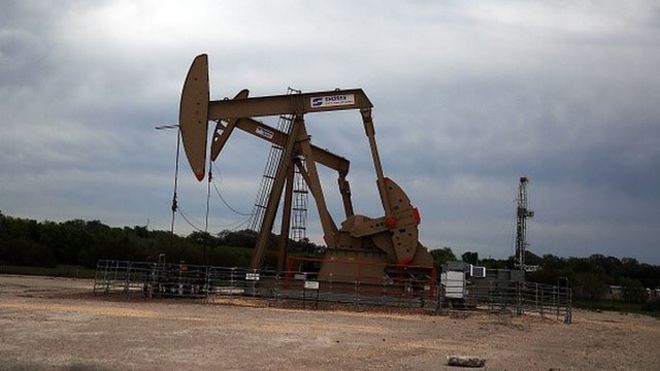 The oil price fall has had a negative impact on a number of countries, the IMF says
The oil price fall has had a negative impact on a number of countries, the IMF says
The risks to global financial stability have risen, the International Monetary Fund (IMF) has said.
In a new report, the IMF says that countries that export oil and other commodities have been severely affected.
Some emerging economies have been hit by sharp moves in the global currency markets.
And the report says financial stability is still not "fully grounded" in the rich countries.
"Risks to the global financial system have risen since October and have rotated to parts of the financial system where they are harder to assess and harder to address," said Jose Vinals, financial counsellor at the IMF.
The IMF acknowledges that recent declines in the prices of oil and other commodities are on balance helpful for global economic prospects.
But they create a major challenge for countries and firms that export them.
It says the strains in debt repayment capacity are apparent for oil and gas businesses in Argentina, Brazil, South Africa and Nigeria.
Debt servicing is also a concern for governments reliant on oil revenues such as Nigeria and Venezuela. Many other major oil exporters have sufficient reserves to enable them to cope with lower prices for some time.
Other developing nations, those that import commodities, do however benefit from these lower prices
Movements in the currency markets have also hit some emerging countries. The rise in the value of the dollar increases the repayment burden for firms and governments that have borrowed in the US currency. Some have also faced significant outflows of capital.
Interest rate hike fears
There is also a warning that there could be more of that when the US Federal Reserve starts to raise interest rates, which is expected later this year. It might happen smoothly, but the report says there is a danger that it might spark more volatility.
The report also says that there's a danger of property price declines in some countries, especially in China, which could spill over to emerging countries more widely.
In the rich countries very low interest rates - welcomed by the IMF for their economic benefits - do nonetheless pose some financial issues. Some European life insurers could struggle and low rates are reflected in more financial risk taking as investors seek better returns.
Some elements of this picture of rising risks reflects the aftermath of the financial crisis. The low interest rates in the rich countries, for example are part of the response to the economic damage, but they do create new risks.
The rising dollar is, indirectly, the result of the more rapid post-crisis rebound in the US compared with continental Europe. Six-and-a-half years on from the most intense phase of the crisis, its long shadow remains.
Still, the IMF does see some more encouraging developments. In particular economic growth is expected to be slightly higher this year and next, which would tend to promote financial stability.
No comments:
Post a Comment